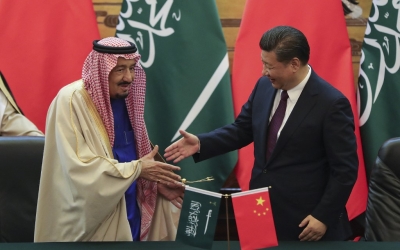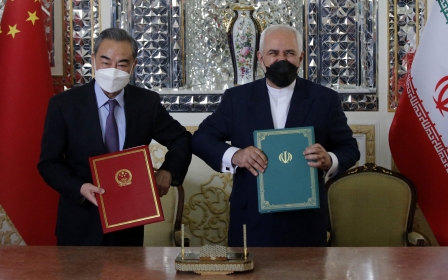China denounces US bill aimed at curtailing Beijing's economic and military ambitions

China on Wednesday condemned a bill approved by the United States Senate that aims to counter Beijing's growing economic and military prowess in the global arena.
China's Foreign Affairs Committee announced its "strong dissatisfaction and resolute opposition" to the legislation, adding the US would use the measures contained within it to interfere in China's domestic affairs.
"This bill seeks to exaggerate and spread the so-called ‘China threat’ to maintain global American hegemony, using human rights and religion as excuses to interfere in China’s domestic politics, and deprive China of its legitimate development rights," the statement said, according to the AP.
"No force should expect that China will swallow any bitter fruit that harms China’s sovereignty, security or development interests."
The US Innovation and Competition Act, which passed in the Senate on Tuesday with a 68-32 vote, seeks to invest billions of dollars into addressing technology issues and cybersecurity concerns in order to put Washington on an even footing with Beijing.
"I have watched China take advantage of us in ways, legal and illegal, over the years," Senate Majority Leader Chuck Schumer, the lead author of the bill, said during an interview before its passage.
"The number one thing China was doing to take advantage of us … was investing heavily in research and science. And if we didn't do something about it, they would become the number one economy in the world."
It remains unclear whether the legislation will also pass in the House of Representatives, where some Democrats have raised early concerns with the Senate's approach.
The bill's central point is a $50bn allocation to the Commerce Department to support semiconductor development and manufacturing through research and incentive programmes previously authorised by Congress.
China's growing Middle East footprint
While the legislation is focused on increasing American competitiveness with China, it also includes a bill that focuses on combating Beijing in areas around the world by raising awareness "regarding the negative impact of activities related to the Belt and Road Initiative".
This includes $300m for a "Countering Chinese Influence" fund and $100m in funding for journalists and media companies to report on China.
The bill, which was folded into the US Innovation and Competition Act, outlines a number of ways for the US to challenge China's Belt and Road Initiative (BRI) in the Middle East.
The legislation's section on the Middle East and North Africa says Washington needs to increase security cooperation with allies and engagement on infrastructure projects, including ports. Still, it does not offer any specific projects or funding.
Experts told Middle East Eye earlier this month, that with the US currently having the largest security presence in the MENA region, concerns of a national security threat connected with China may be exaggerated despite Beijing's growing economic and diplomatic footprint.
John Calabrese, director of the Middle East-Asia Project at the Middle East Institute, said it was risky for the legislation to associate every Chinese project in the Middle East "with a grand strategic ambition to either undercut the United States or replace the United States".
Middle East Eye propose une couverture et une analyse indépendantes et incomparables du Moyen-Orient, de l’Afrique du Nord et d’autres régions du monde. Pour en savoir plus sur la reprise de ce contenu et les frais qui s’appliquent, veuillez remplir ce formulaire [en anglais]. Pour en savoir plus sur MEE, cliquez ici [en anglais].





